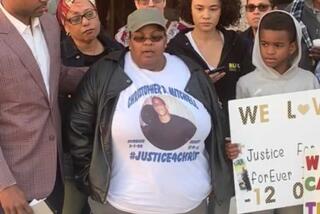San Diego Chief Subdued, His Officers Angry
SAN DIEGO — A subdued San Diego Police Chief Bill Kolender said Thursday that his department accepts the innocent verdicts in the Sagon Penn police shootings, but rank-and-file officers were angry and disappointed.
“The system has spoken and my police officers and I will abide by this decision,” Kolender said at a press conference. “I pray that time will heal all wounds.”
Several police officers called the jury’s decision an injustice.
“I’m upset,” said Officer Charles Graham, who added that “you have to do your job and control your feelings.”
Officer Rudy Basha expressed disappointment and said, “Hopefully, everyone won’t think they can shoot a cop and get away with it.”
Another officer said he had no comment because “what I have to say you couldn’t put into print anyhow.”
Black leaders in San Diego said they were relieved that the judicial system worked.
Willie Morrow, who owns a newspaper and radio station, said the verdicts “kind of restored the community’s confidence in the system . . . that it can work both ways.”
He cautioned, however, that unless the case is put to rest for good, it will cause needless and bitter racial tension.
“Blacks are saying, ‘Thank God,’ and some whites are saying, ‘It’s a disgrace.’ The danger is black citizens applauding it and white people denouncing it . . . because it’s not who won and who lost as far as race is concerned.”
Mayor Maureen O’Connor counseled calm, saying: “Our judicial system is based upon the integrity of the jury process. I urge all citizens to respect the verdict.”
Kolender said his personal reaction “. . . is of no consequence. Regardless of how I would feel personally, like the rest of our officers I’m a professional and my responsibility is to police this city and that’s what I’m going to do.”
Kolender’s response was in stark contrast to his reaction to the innocent verdicts in the first trial when a jury acquitted Penn of murder and attempted murder charges in the slaying of Officer Thomas Riggs and the wounding of Officer Donovan Jacobs. Kolender said last year he was “very disappointed” and said the decision would leave his officers “angry and sad.” In the past, the chief has referred to Penn as “a cop killer.”
This year, police officials orchestrated a department-wide effort to prevent anyone from making “inflammatory” comments in the wake of the innocent verdicts, Assistant Police Chief Bob Burgreen said.
“That shows you how things have changed,” said Lt. Mike Gillespie, a black supervisor in Southeast San Diego. “What the chief said last time and this time shows that we live and we learn.”
Despite his subdued reaction, Kolender still insisted that Jacobs had acted properly the night of the shooting. Numerous witnesses had testified that Jacobs used excessive force and told Penn, “I’ll beat your black ass.”
“The fact that Sagon Penn was found not guilty on those counts does not make Donovan Jacobs guilty,” Kolender said. “It is our opinion, and that of the district attorney, that the case at the scene was handled as best it could be under the circumstances.”
In the neighborhood where the shootings occurred, black, white and Latino children played Thursday on Brooklyn Avenue, the dusty dead-end street where police and Penn had their confrontation on March 31, 1985.
Schuntay Specks was 15 when the shooting occurred, a frightened teen-ager who saw parts of the incident and heard the gunshots from inside a neighbor’s house, where she and her friends hid.
“I’m happy it’s now mostly over. I think they’ve been dragging it on too long. . . . I think it should have been decided the first time,” said Specks, 17, who testified at Penn’s first trial, and whose mother, Kaye Specks, testified at both trials.
In an apartment house a few doors down, Demetria Shelby, 30, was an eyewitness to the shootings. “I hope everything has been taken care of today. I feel everything should be dropped from now on, period,” said Shelby, another of the neighborhood residents who testified at both trials.
“There are good cops and there are bad cops. I hope the bad cops are controlling what they are doing. I hope that they think twice because you never know who’s watching.”
More to Read
Sign up for Essential California
The most important California stories and recommendations in your inbox every morning.
You may occasionally receive promotional content from the Los Angeles Times.










